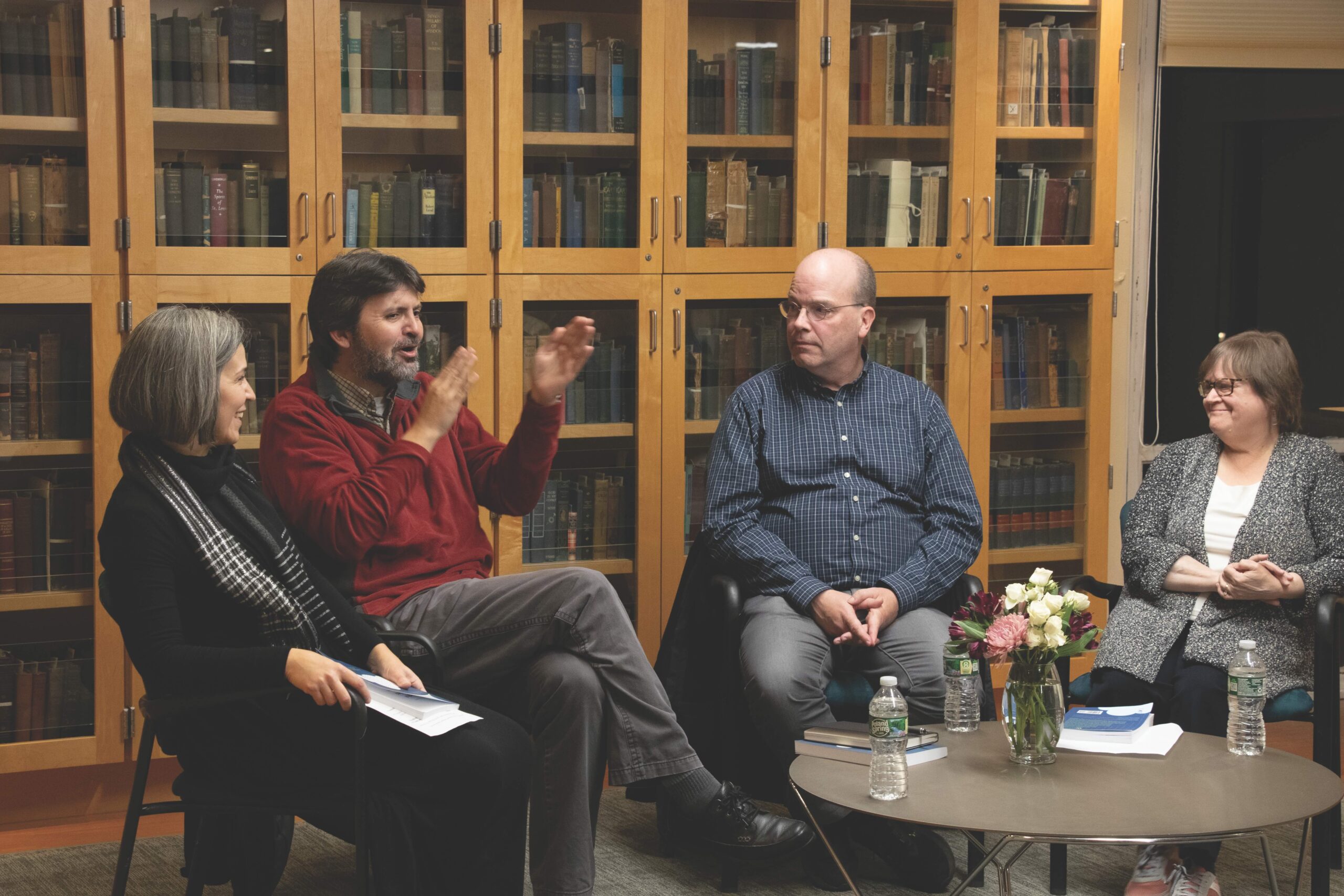DCS professors launch book on digital metaphors
December 1, 2023
 Amira Oguntoyinbo
Amira OguntoyinboOn Thursday, Professor of Digital and Computational Studies Eric Chown and Assistant Professor of Digital and Computational Studies Fernando Nascimento discussed their new book, “Meaningful Technologies: How Digital Metaphors Change the Way We Think and Live.” They were joined by Associate Professor of English Ann Kibbie and Associate Professor of German Jill Smith in a panel discussion.
Digital metaphors are technological redefinitions of pre-existing human concepts. For example, the book cites texting as a digital metaphor for conversation in its introduction. Chown and Nascimento argue in their book that digital metaphors are not used in a void to simply describe or explain. Instead, digital metaphors are used to influence the way people think about certain topics and relationships. According to Nascimento, this nuanced application of the digital metaphor informed their choice of the book’s title.
“The title of the book was very intentional: ‘Meaningful’ has a lot to do with Digital and Computational Studies. The idea of ‘Meaningful’ is not only to be significant or relevant, but also that it’s full of meaning,” Nascimento said. “Digital technologies have an active sense of creating new meanings in the world.”
Examples of how advancements in digital technologies have changed meanings in this way include Facebook redefining the concept of friendship through “friending” or Snapchat redefining the definition of memories through its archive of photos.
To Chown, digital metaphors like these may obscure the true impact of technologies that are part of our everyday lives to the public. Chown pulled the seemingly entirely virtual data cloud as an example of this deception.
“Metaphors are used everywhere. They have to be. The public are not experts on h ow to make apps and so metaphors have to be used in tech,” Chown said. “The [data] cloud is a great example. It sounds so nice. But data centers [that host data clouds] are using power and water, and they’re putting out pollution, so that metaphor is really harmful.”
In the book’s final chapter, Nascimento and Chown review the impact these types of digital metaphors have on users of technology.
“We’ve been looking at ways in which metaphors explain but also deceive. They shed light on certain [benefits], but they hide or leave aside all other aspects,” Nascimento said.
This means that many digital metaphors are accompanied by ethical harm that slips the notice of users of technology. Nascimento raised one example of this type of deception that could be ethically harmful to users: the digital metaphor of video streaming in relation to actual streams of water in nature.
“When you think about streaming … many of us will think about clean water [flowing] in a single direction, and no one knows upstream what you are doing downstream,” Nascimento said. “But when you start to unpack the [streaming] metaphor, you see how the metaphor is very useful to exploit certain benefits but also hides the fact that every time that you go to a video stream, someone is measuring how much water you are taking out of the stream.”
The book idea began with broad discussions between Chown and Nascimento about digital metaphors without the intention of writing a book about the subject. However, the two professors soon began gaining momentum in their work on digital metaphors and benefitted from having each other in the outlining process.
“Early in our working relationship, we found writing is a lot easier when you have good structure,” Chown said. “I suggested, ‘What if we treated each chapter as if we were going to teach it in a class?’ And so we made PowerPoints to just go through the points we’re trying to get across, and that helped us think about how the information all fit together.”
Attendee Daniel Wang ’26 initially came to the talk because he knew professors involved in the event, but he came away with larger takeaways about the potential harm of everyday technologies through digital metaphors.
“I’ve taken and sat in on courses with all the professors on the panel,” Wang said. “So, looking at the title of this book, it interested me because at the moment I was thinking about our phones [and their impacts] in our lives but also problems with AI misalignment and misunderstanding due to these metaphors.”
Associate Professor of Romance Languages and Literatures and Cinema Studies Allison Cooper has looked at technological impacts in her work and was intrigued by this different academic approach to technology.
“I studied representations of technology and film, and I was interested in learning more about how cognitive scientists think about representations when it comes to technology,” Cooper said. “So, it’s really interesting to hear about the way that metaphors exert control over us, users who understand technology and the way that we apply metaphors to technology to understand it.”

Comments
Before submitting a comment, please review our comment policy. Some key points from the policy: